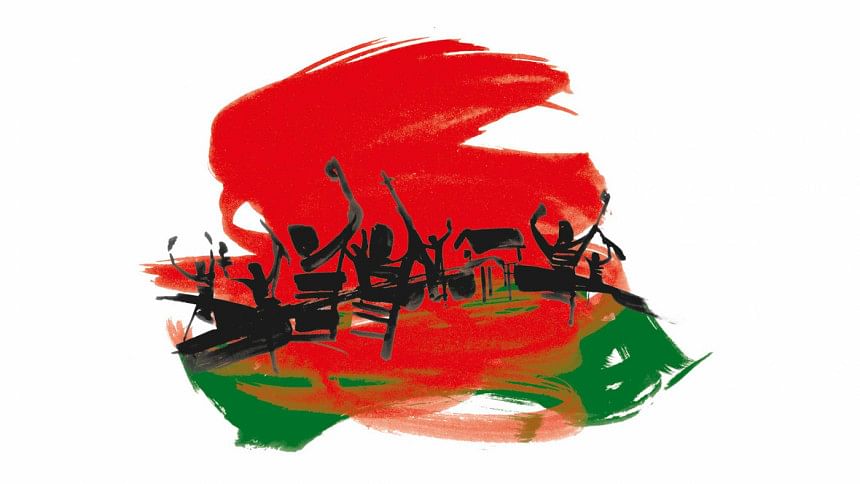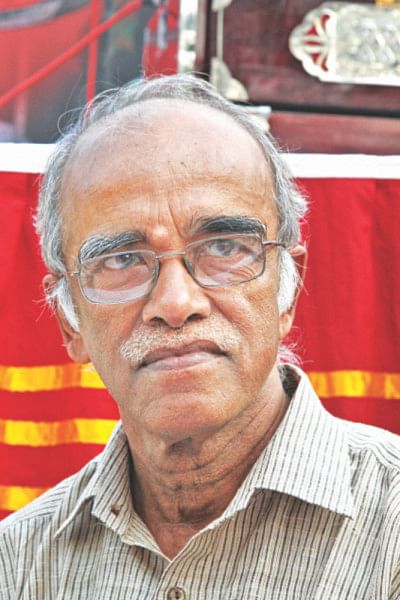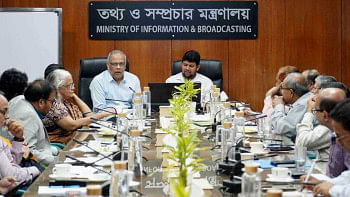‘We must stand united to uphold the spirit of our Liberation War’

On the occasion of Victory Day, Mofidul Hoque, war crimes researcher and trustee of the Liberation War Museum, speaks to Shuprova Tasneem of The Daily Star about the incredible journey that Bangladesh has gone through, and what must be done to preserve that history.

We are celebrating 50 years of our victory this year. Being someone who lived through the war and celebrated this victory, what do you think is the significance of this milestone?
Celebrating 50 years of victory is definitely a milestone for any nation, and is especially so for Bangladesh. There are not too many examples in the world of freedom being achieved through such a bloody struggle against its oppressors.
Pakistan became an oppressive state from the very beginning of Partition, because it was founded on the two-nation theory. Being a religion-based communal state, it ideologically excluded all other identities. The Bengali nation, under Bangabandhu's leadership, was liberated from Pakistan's occupation on December 16, 1971, which re-established our rights. So the 50th anniversary of that victory and the freedom gained from that is definitely a big achievement to celebrate. Throughout this journey, the nation went through many ups and downs, but the basic values that we held on to gave the nation the strength to flourish.
There was a long period of darkness after the brutal assassination of Bangabandhu. There was denial and distortion of history, and the fundamental values of the nation were repressed—the very values that inspired us in our struggle for liberation. Our constitution was also not spared: the anti-communal ideologies were removed from it.
But Bangladesh has turned around and stayed strong to uphold the spirit of the Liberation War. It is really inspiring to see that the generations, born after 1971, played a significant role at some turning points of the country: The movement for the trial of the war criminals under the leadership of Jahanara Imam, and the 2008 election, in which an overwhelming number of younger voters participated to give a mass verdict in favour of the spirit of liberation.
However, we must remember that while currently Bangladesh has many achievements in terms of economic development, we also have many failures in addressing various major issues, such as ensuring good governance and fighting against communalism and hatred. Social media has particularly become a place for hate campaigns. Corruption has also become a big issue. If we want to uphold the spirit of our Liberation War, we must stand united to re-establish the values and ideals that it was founded upon as well.
The trial of war criminals in Bangladesh has been a major achievement, but on an international level, there is still very little legal recognition of the 1971 genocide, and Pakistan has not apologised or even acknowledged it. What are your thoughts on this?
This is a difficult issue, and we need to be prepared to wage a long battle over this. We fought to establish our right as a nation; we have held trials at domestic tribunals for criminals who were the Pakistani's local collaborators, and we are continuing to enforce justice and accountability. The International Crimes (Tribunals) Act, 1973, which was enacted in our parliament, is a major achievement and a seminal legal document for the trial of the perpetrators of genocide, even when viewed from a global perspective.
But a fundamental question remains: How do we put on trial the major perpetrators—those who planned and executed the genocide? We have established our moral right through our own domestic tribunal, which is increasingly becoming accepted and appreciated internationally. The continuation of this work will be the trial of Pakistani war criminals.
There is the possibility of a symbolic trial—if we can conduct it on an international level. In terms of international courts, the major obstacle is that the International Criminal Court does not deal with retrospective justice; events that occurred before 2002 do not fall under their jurisdiction. So what will happen to such events?
There are examples of many countries that have now apologised for past atrocities. The latest one is by Germany for the Herero-Nama genocide in Namibia, for which they also agreed to pay reparations. And even this took about 100 years to fulfil. Justice is being delayed for sure, but we must stay vigilant that justice is not in any way denied. We need to keep the flame of truth and justice burning, and for this, we should also communicate with Pakistan's civil society to make our voices heard. It is now much easier to raise issues across borders via social media—we can use technology to conduct a vigorous campaign.
Some progress has been made in Pakistan. For example, Jahanara Imam's "Ekattorer Dinguli" has been translated into Urdu and published in Lahore. We need to ensure that such efforts are continued. This is a multifarious struggle, and I think we need to continue this struggle in a more serious and determined manner. Ultimately, I believe that we will prevail, and the new generation now has the greater responsibility to carry it forward.
You said previously that the war in 1971 was very much a fight against communalism. Are we still fighting this battle?
In 1947, a communal state was established, and we fought against a state ideology that was very much communal. The secular philosophy was simply not practised. But it is the core psyche of the Bengali people, who have always had a diverse culture and society that spanned over thousands of years.
We are now facing a completely new challenge: the rise of fundamentalism in various religions. It is not only Islam that is being misinterpreted. Christianity is being manipulated in certain European countries as well as the US, while a political game surrounding Hinduism is being played out in the subcontinent. We have also witnessed what Myanmar has done with Buddhism, once known as the religion of non-violence. We are in the middle of a global civilizational crisis, where, despite material achievements, we still witness conflict, intolerance, hate and violence. In the face of all these, it is not just a secular philosophy, but the ideals of humanity that are coming under threat.
So I would say that Bangladesh's struggle is a struggle for humankind, and Bangladesh has shown the path and inculcated it into its constitution, and we are now fighting to establish it in our society. And we have to keep fighting—as they say, continuous vigil is the price of freedom. Secularism is not achieved by simply declaring it or even codifying it. Education and culture has the strongest roles in defending us in these circumstances. On the 50th anniversary of Bangladesh's independence, we need to take stock and come to this realisation. Our goal is fine, but we need to change and develop our methods.
As time goes on, do you think younger generations will become less interested in learning about (what will seem to them like) a distant past? How do we tackle this?
Studies of history will shift, change and adapt, but some fundamental historical truths will remain. Our colonial legacy, the fact that we have suffered huge plunder and been greatly harmed as a result, is a fundamental truth. The emergence of Bangladesh, similarly, is a fundamental truth. So many people have stood up with so much courage, and sacrificed so much for the sake of our core values, that the knowledge of this is bound to be intergenerational. And this intergenerational memory is what makes societies diverse—what makes every country and its people unique.
History is on our side, but limiting history to our syllabuses and to questions on exam papers will not do any good. We need different exercises of remembering that are beyond our current educational remit, including more cultural interpretations. There is no easy formula to create a connection between younger generations and the Liberation War, but we need to work on many different plains, including through museums, theatre, art, etc.
Another important factor is public memory. Every family carries a bit of 1971—every family has a refugee, freedom fighter, or martyr. The generation who witnessed the Liberation War has a responsibility to share their experiences, and as a society and a nation, we all have our parts to play—including the government. I think instead of worrying about what the new generation will or will not do, we should focus on whether we are able to bring history to them in a way that touches them. And the new generation also has a responsibility of wanting to know. We also need to promote the great creative work that many young people have been doing on the Liberation War.
I am hopeful, because without hope Bangladesh would not have been created, and we would not have overcome so many obstacles to come as far as we have. However, only hope is not enough; we must work to turn them into reality.

 For all latest news, follow The Daily Star's Google News channel.
For all latest news, follow The Daily Star's Google News channel. 



Comments